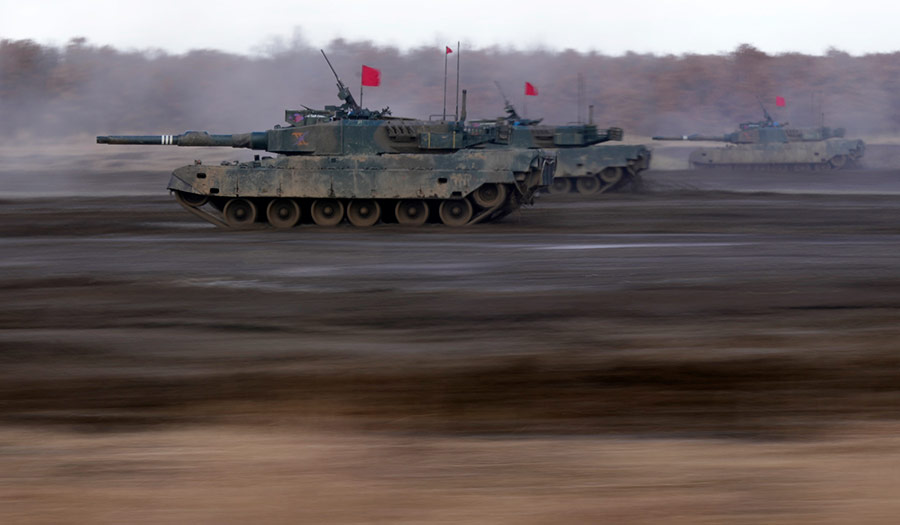 AP/Eugene Hoshiko
AP/Eugene Hoshiko
World News Desk
Learn the why behind the headlines.
Subscribe to the Real Truth for FREE news and analysis.
Subscribe NowENIWA, Japan (AP) – Dozens of tanks and soldiers fired explosives and machine guns in drills Monday on Japan’s northern island of Hokkaido, a main stronghold for a nation that is perhaps the world’s least-known military powerhouse.
Just across the sea from rival Russia, Japan opened up its humbly named Self-Defense Forces’ firing exercises to the media in a display of public firepower that coincides with a recent escalation of Chinese and Russian military moves around Japanese territory.
The drills, which foreign journalists rarely have a chance to witness, will continue for nine days and include about 1,300 Ground Self-Defense Forces troops. On Monday, as hundreds of soldiers cheered from the sidelines and waved unit flags, lines of tanks shot at targets meant to represent enemy missiles or armored vehicles.
The exercises illuminate a fascinating, easy-to-miss point. Japan, despite an officially pacifist constitution written when memories of its World War II rampage were still fresh—and painful—boasts a military that puts all but a few nations to shame.
And, with a host of threats lurking in Northeast Asia, its hawkish leaders are eager for more.
It is not an easy sell. In a nation still reviled by many of its neighbors for its past military actions, and where domestic pacifism runs high, any military buildup is controversial.
Japan has focused on its defensive capabilities and carefully avoids using the word “military” for its troops. But as it looks to defend its territorial and military interests against an assertive China, North Korea and Russia, officials in Tokyo are pushing citizens to put aside widespread unease over a more robust role for the military and support increased defense spending.
As it is, tens of billions of dollars each year have built an arsenal of nearly 1,000 warplanes and dozens of destroyers and submarines. Japan’s forces rival those of Britain and France, and show no sign of slowing down in a pursuit of the best equipment and weapons money can buy.
Not everyone agrees with this buildup. Critics, both Japan’s neighbors and at home, urge Tokyo to learn from its past and pull back from military expansion.
There is also domestic wariness over nuclear weapons. Japan, the only nation to have atomic bombs dropped on it in war, possesses no nuclear deterrent, unlike other top global militaries, and relies on the so-called U.S. nuclear umbrella.
Proponents of the new military muscle flexing, however, say the expansion is well-timed and crucial to the Japanese alliance with Washington.
China and Russia have stepped up military cooperation in recent years in an attempt to counter growing U.S.-led regional partnerships.
In October, a fleet of five warships each from China and Russia circled Japan as they traveled through the Pacific to the East China Sea. Last month, their warplanes flew together near Japan’s airspace, causing Japanese fighter jets to scramble. In fiscal year 2020 through March, Japanese fighters scrambled more than 700 times—two-thirds against Chinese warplanes, with the remainder mostly against Russians—the Defense Ministry said.
Russia’s military also recently deployed coastal defense missile systems, the Bastion, near disputed islands off the northern coast of Hokkaido.
Japan was disarmed after its WW II defeat. But a month after the Korean War began in 1950, U.S. occupation forces in Japan created a 75,000-member lightly armed de facto army called the National Police Reserve. The Self Defense Force, the country’s current military, was founded in 1954.
Today, Japan is ranked fifth globally in overall military power after the United States, Russia, China and India, and its defense budget ranked sixth in the 2021 ranking of 140 countries by the Global Firepower rating site.
During archconservative former Prime Minister Shinzo Abe’s more than eight-year rule, which ended a year ago, Japan significantly expanded its military role and budget. Mr. Abe also watered down the war-renouncing Article 9 of the constitution in 2015, allowing Japan to come to the defense of the United States and other partner nations.
More on Related Topics:
- What to Know About South Korean Acting President Han’s Impeachment
- The Stunning Fall of Syria’s Government
- Syria: What Has Assad’s Fall Revealed About the Captagon Drug Trade?
- South Korea’s Parliament Votes to Impeach President Yoon Suk Yeol over Martial Law Order
- From Budgets to Diplomacy, South Korea Reels from Martial Law Fallout


